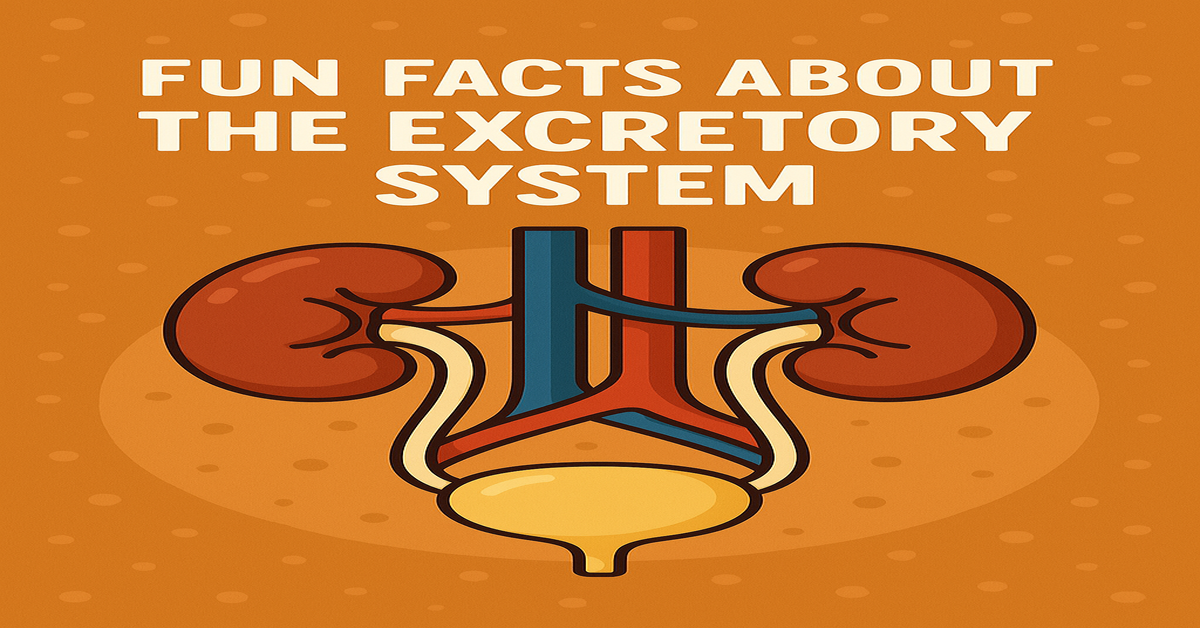Introduction: Not Just that Bathroom Break
The excretory system is also the most underrated but very important system in your body. It operates in tiptop all the time to clean blood, eliminate waste products, diapause fluids as well as sustains your internal world. The excretory system is not the most glamorous, but still, there is a lot to be surprised at. Not only is this system (it has kidneys that are like high-tech filtration plants and bladders that blow up like balloons) fascinating and essential, it is also quite complex.
We are going to discuss some of the amusing and odd facts about the excretory system in this article, which would absolutely give a new perspective to your next visit to the toilet.
Your Kidneys Filter 50 Gallons of Blood Every Single Day
Kidneys can only be as big as your fist but they are very strong. Each day they strain almost 50 gallons (nearly 190 liters) of blood to eliminate wastes as well as excess fluid. The result of this process is approximately 1 to 2 quarts of urine which is disposed by the body. It is like two heavy duty cleansing systems operating all the time in your lower back.
Each Kidney Contains About a Million Tiny Filters
The nephrons are microscopic units performing the sole role of filtering the blood into the kidney; there are approximately 1 million nephrons in each kidney. These nephrons filter out wastes and immensely contribute to the chemical balance in your body. In absence of them, the dangerous toxins would accumulate in your blood resulting to severe illnesses.
Your Bladder Can Expand Like a Balloon
The bladder of a human is capable of retained nearly 400 to 600 milliliters of urine- the volume of a can of soda. It has walls of elastic muscle tissue which expands and collapses. When it fills up nerves signal your brain to indicate that it is the time to go. Amazingly, when you are having a dehydration problem, your body can reabsorb water in the bladder, indicating its survival aptitude.
Living With Single Kidney Is Possible
A good number of individuals lead healthy lifestyles with the single kidney. Actually, some of them are born only with one and have no idea up to years later in their lives. The renal reserve efficiency of the remaining kidney responds through augmenting its filtering activity. This flexibility facilitates donation of kidneys an exercise that saves thousands of lives in yearly basis.
Your Sweat Glands Are Part of the Excretory System
When excretion springs to mind you think of going to the loo but sweat is the removal of waste too. The glands of sweat eliminate the water, salts and a small portion of urea via your skin. This is not only useful in maintaining body temperature but it also plays part in excretion of toxins.
A lot can be said of your health through your urine color
The urine color is an unimaginable indication of your health and hydration levels. Urine that is clear or light yellow is an indication that you are hydrated well. A deficiency of water can give dark yellow-colored as signs of a dried up body or dark yellow or amber. Weird colors such as red, blue or green may signify drugs, particular food or even sicknesses.
Even as you sleep, your Excretory System is at work Average
Also, your body does not go on vacation just because you are having your sleep. Your kidneys keep filtering your blood and would not be as fast as they are when you are awake though in sleep they are not as fast. That is the reason why first time you visit the bathroom in the morning you normally have a fully loaded bladder.
You Pee Six to Eight Times each Day
The normal adult urinates 6-8 times in a day on average. The figure may change depending on the hydration level, intensity of the activities and medical conditions. Urinary disorders are also manifested by multiple urination that may be a symptom of diabetes or a urinary tract infection as well as insufficient urinary discharge that may signal dehydration or kidney complications.
Liver and Lungs Aid in Excretion as well
Your liver and lungs have important secondary roles although they are not found in the excretory system. The liver aids in detoxification of toxic body substances such as alcohol, drugs and by-products of metabolism. Even when you breathe out, the carbon dioxide produced because of cellular respiration in your body is released into the air through the lungs.
Urine actually Has Been a Cleaning Agent in Ancient Rome
It is hard to believe, but the urine was the first cleaning solution utilized by ancient Romans. Urine is a strong cleaning fluid and the ammonia present in the urine was used to bleach clothes and sometimes whites the teeth. That may sound disgusting in these modern times but it serves us as a reminder of the ingenuity presented by humans when supplying byproducts of the body.
Dehydration Makes Urine More Concentrated and Smelly
When you are dehydrated, the body attempts to hold water. This results in presence of more concentrated urine that is darker in colour and has a stronger smell. Hence, hydration is not only beneficial to your kidneys but also limits the chances of urinary tract infection and kidney stones.
Excretory system Aids in balancing Blood pressure
Kidneys do not only synthesize waste, but they also aid in blood pressure regulation. They achieve this by regulating water intake and secretion of hormones such as renin hormone that regulates the constricting of blood vessels. When your kidney is unable to work well, it may result into high blood pressure and its complications.
Children are forced to Learn Excretory Control
At birth the infants lack excretory control of their body. The period associated with toilet training commences at 18 months to 3 years. Children require time to exercise neurological and muscular control over the ability to hold and release urine and feces on their own.
Animals Have Unique Excretory Systems Too
Animals dispose waste in different manners. Birds produce uric acid as opposed to urea, and this saves them water. Fish release ammonia in water through gills. Even insects such as grasshopper have specialized structures called Malpighian tubules with which to control excretion.
In Case of Emergencies Your Body can Recycle Waste
Your body can actually absorb the stored water and the vital salts when you are in such desperate survival conditions especially through the intestines and the bladder. It does not imply that you need to use your own urine to drink, but it demonstrates the level of adaptability of the human body when the latter attempts to stay alive.
Conclusion: A Silent System Which Needs Greater Respect
The excretory system may not be one of the most popular dinner table conversation, but it is something that is very essential in keeping you healthy and alive. Your kidneys, bladder and related organs do not stop working, even at balancing the fluid in your body and eliminating risky toxins. Next time you read about this silent superhero system, you will be able to approach it with a brand new set of eyes due to the fun facts that you have just learned.




